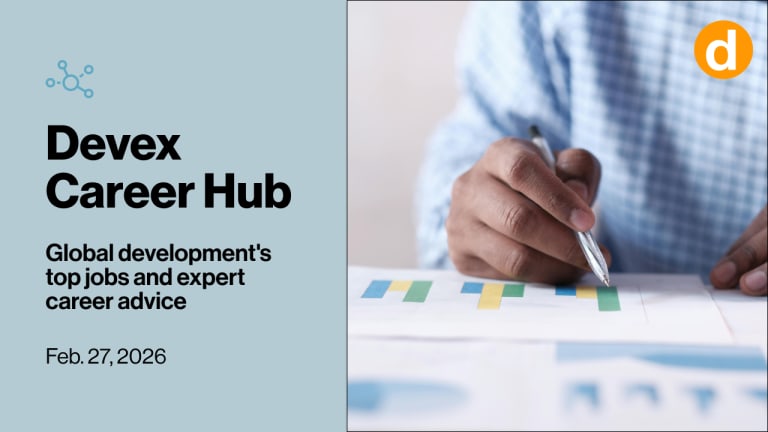Globaldev careers: The monitoring and evaluation expert
Monitoring and evaluation specialist Gertrude Matsika discusses why an ability to influence people is key to the role.
GABORONE, Botswana — When Gertrude Matsika graduated from college with a bachelor’s in economics in 1997, she believed she would join the banking sector — but it was not to be. More than 20 years down the line, she credits her passion for helping people and divine intervention for leading her through a series of alternative career choices that ended in the development sector as an expert in monitoring and evaluation, or M&E. The field, also sometimes known as monitoring, evaluation, and learning, helps to provide development organizations with insight into whether a project is having the desired impact, whether it is cost-effective, and how it could be improved. “I started at a local grassroots level, grew my skills, and worked my way up to a regional organization before joining the United Nations family, initially with UN Women and now with UNICEF,” she said. Devex spoke to Matsika about what her work entails and what it takes to succeed in the field. This conversation has been edited for length and clarity. What does a monitoring and evaluation job involve? Mainly it involves providing technical support, coordination, and advisory services around monitoring and evaluation at different levels. “Monitoring and evaluation” is quite often taken together to mean the same thing, but actually the two are distinct with different methodologies and scopes — although they are interrelated because the “M” feeds into the “E.” Monitoring focuses on the ongoing process of tracking results. This looks at whether we are moving toward our targets, and it’s an ongoing process. Meanwhile, evaluation is an assessment conducted in a systematic and impartial manner. In terms of the roles of the M&E expert, it includes results- and evidence-based planning and budgeting, results monitoring and reporting, research and evaluation, and establishing strategic partnerships — this is critical for M&E work. M&E is crosscutting. You don’t have a program as an M&E expert, but you work with different stakeholders and different departments, so the M&E work must involve establishing strategic partnerships and strengthening the capacity of stakeholders. “The key enabling factor for M&E to succeed is investing in relationship building, reading widely, and consulting the subject matter experts. … You cannot do M&E alone.” --— Gertrude Matsika, monitoring and evaluation specialist What does your day-to-day look like? It is so diverse and requires flexibility and open-mindedness. After all, you provide technical support and advisory services, so there can be a need that arises anytime. In general, my day-to-day work involves results monitoring and supporting UNICEF sections by providing technical support in their planning, in their monitoring of results, and in their reporting. I also do evaluation management and quality assurance and support the planning function by reviewing program documents, reviewing annual work plans, and ensuring they are up to standard and align to results-based management principles, because the major aim of M&E is to ensure delivery of results in a cost-efficient and effective manner. What are the best — and worst — parts of the job? The best part of my job is networking and relationship building; when I work with teams and influence them to deliver results, I feel so excited. The worst part is when your client does not see the value of what you are doing. This is a challenge with M&E. At times, it’s a struggle to find space for yourself and help people appreciate M&E. But once you get them on board, you are good to go, and it becomes exciting. So the worst part is when you face pushback or resistance in pushing the M&E agenda. What are the biggest challenges of the job, and what lessons have you learned to help you overcome these? The biggest challenge is that because M&E is crosscutting, it involves the coordination of various stakeholders who may not place much value on it. You are working with experts or officers who have their own priorities … and it may be difficult to get buy-in. What I have learned is that the key enabling factor for M&E to succeed is investing in relationship building, reading widely, and consulting the subject matter experts, so that when you start advocating for M&E, it becomes easier to get buy-in and have M&E integrated throughout the program or project cycle. You cannot do M&E alone. What are the opportunities to do this kind of work in the sector? There are vast opportunities in this sector, considering that the Agenda 2030 for sustainable development emphasizes the importance of data and evidence and of getting a deeper understanding of the context, causes, and consequences of any intervention, which can only be done through robust M&E systems and processes. COVID-19 also provides an opportunity for innovative M&E systems. How have you seen the scope of your work change as the sector has changed? I started in M&E prior to the Millennium Development Goals, which had eight goals. Now, we are speaking of the Sustainable Development Goals with 17 goals. The context is [always] changing, and you have to adapt. With emergencies like COVID-19, you need to be flexible. Traditional practices of M&E won’t work. Who knew that we would not be able to go into the field to do monitoring? Now we are monitoring using virtual platforms, using SMS, telephone, U-Report, different monitoring tools. The context has changed once again, so my role and scope of my work have also changed. What kind of person does this job suit? This job is best suited to somebody who can work with teams … somebody who can coordinate different teams from different backgrounds. As an M&E expert, you will work with other experts in their fields, and you will want to influence a field in which you are not an expert. For example, I work with health experts, people who have been trained in that area, and I am seeking to influence their programming, but I am not an expert in that area; I am an expert in driving for results. You need to be able to relate well with your colleagues, and you need to be good at building and maintaining relationships, in addition to the technical skills. Knowledge of the results framework alone will not lead to results.
GABORONE, Botswana — When Gertrude Matsika graduated from college with a bachelor’s in economics in 1997, she believed she would join the banking sector — but it was not to be.
More than 20 years down the line, she credits her passion for helping people and divine intervention for leading her through a series of alternative career choices that ended in the development sector as an expert in monitoring and evaluation, or M&E.
The field, also sometimes known as monitoring, evaluation, and learning, helps to provide development organizations with insight into whether a project is having the desired impact, whether it is cost-effective, and how it could be improved.
This article is exclusively for Career Account members.
Unlock this article now with a 15-day free trial of a Devex Career Account. With a Career Account subscription you will get:
- Full access to our jobs board, including over 1,000 exclusive jobs
- Your Devex profile highlighted in recruiter search results
- Connections to recruiters and industry experts through online and live Devex events
Start my 15-day free trialAlready a user?
Printing articles to share with others is a breach of our terms and conditions and copyright policy. Please use the sharing options on the left side of the article. Devex Pro members may share up to 10 articles per month using the Pro share tool ( ).
Rumbi Chakamba is a Senior Editor at Devex based in Botswana, who has worked with regional and international publications including News Deeply, The Zambezian, Outriders Network, and Global Sisters Report. She holds a bachelor's degree in international relations from the University of South Africa.








